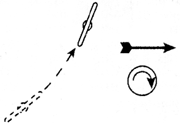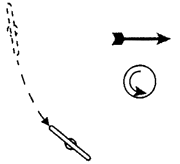|

PLAYING AGAINST LONG PIMPLES
Part 1 : Key Thoughts and the Long Pimpled Effect
The Best Way to get to grips with the surface is to assume that:
Long pimples do not put any spin on the ball at all, they return your
own spin to you.
This leads to the somewhat surprising result (see the diagram):
If you do a topspin - the ball will come back with backspin
If you do a chop( or a push) - the ball will come back with mild topspin
|
You do a forehand drive which produces
topspin |
|
You do a chop |
 |
|
 |
|
The ball is rotating clockwise.
then The long pimpled player does a block. |
|
The ball is rotating anticlockwise
then
The long pimpled player does a block. |
 |
|
 |
|
The pimples have no effect on the spin, so the ball is
still rotating in a clockwise direction. |
|
The ball is still rotating anticlockwise. |
|
This means it will be returned to
you with backspin. |
|
So the return will look like a topspin to you |
Your chops and pushes only come back with a small amount of topspin because your
chops and pushes will only contain a small amount of spin, much less spin than
your hits.
Although a block is shown in the diagrams the effect is the same regardless of
the movement of the pimpled bat. And herein lies the problem because your
experience tells you that if your opponent does an upward movement of the bat
there will be topspin on the ball and if he does a downward movement there will
be backspin on it.
You will judge the amount of spin by many factors such as the speed of the arm,
the path of the arm etc. all this information will be assessed by the brain in a
split second and will be the result of knowledge gained over many hours of play.
In fact one of the reason why we practice is to be able to make these sort of
judgement automatically.
But when playing against long pimples, your experience lets you down. It is not
what your opponent does with his bat that is important but what you did with
your last shot. So you have got to re-train your brain and try to remember what
you did with your last shot.
Surprisingly this is not very easy, and even after you train yourself to do it,
you will often forget and make the most basic and, seemingly, simple mistakes.
When this happens don't
panic just keep calm and try to recollect what you should be doing and have the
confidence and courage to act accordingly.
Now I am going the make the statement which, I am sure,many people will disagree
with. I think it is largely true but in any cases it is the best thought to have
in your head.
The harder you hit the ball the more topspin will be
on it
This means
The harder you hit the ball the more backspin you will
receive back
This last statement needs to be borne in mind when playing against long
pimpled defenders.
So a slow hit will contain a small amount of of topspin and any long pimpled
return will contain a small amount of backspin. A hard hit will contain a lot
of topspin and so a long pimpled return will contain a lot of backspin.
These last two sentences are very important, and they should give you a clue
as to how to play against long pimples. We will come back to them later.
In the next part we will look at some typical rallies and see how things can
go wrong when playing against long pimples. In the meantime study the diagrams
and memorize the key thoughts because they are at the heart of the long pimpled
effect.
Part 2 : Long Pimpled Defenders - the core of
the problem
We now come to what is probably the core of the difficulties encountered by
attacking players when playing against long pimples. I am illustrating these
difficulties by analysing a number of rallies between you, a modern attacking
player, and a long pimpled defender - Mr. Pimps. The rallies are typical of the
sort of thing I have seen many times in encounters between these types of
players.
First two comments:
when you play a defensive player you will often get points early on in
the game with hard hits, but as the game goes on the defensive player will get
the measure of your hits and get them back. I have assumed this has happened
when the score is 5-5. It is unlikely that when you play a game you will analyse
each shot as I indicated in the table. Most of the time you will judge each shot
automatically using your experience. But when playing against pimples you have
got to think more and put your experience aside.
The score is 5 all with Mr. Pimps to serve
|
Mr. Pimps |
You |
Result |
Reason |
|
Score 5-5 |
|
1. Serves - a long slow serve with a chopping action |
2. Try to hit it hard |
It goes off the end |
The chopping action makes you think there is chop on the
ball so you lift it; but, in fact, there is no spin on it. |
|
Score : 6-5 |
|
1. Serves
3. Chops it back |
2. you are more cautious and do a soft hit - it will
contain a small amount of topspin
4. Hit it hard |
You hit it past him
(you think you have cracked it) |
The small amount of topspin you put on the ball with
return of serve, shot 2, comes back to you as a gentle chop. In fact
just the amount of chop you would expect from a normal bat with the same
action; so, luckily, you judged it correctly. |
|
Score 6-6 |
|
1. Serves
3. Chops it back
5. This time he just scrambles it back, but is out of position.
|
2. Another soft hit
4. Hit it hard
6. Try to hit hard again |
It goes into the bottom of the net |
Your first hard hit, shot 4, contains a great deal of
topspin which is returned to you as a very heavy chop. |
|
Score 7-6 |
|
1. Serves
3. Chops it back
5. This time he just scrambles it back, but is out of position.
7. Pushes it back with a chopping action |
2. Another soft hit
4. Hit it hard
6. This time you push, lifting it to allow for the chop
8. Try to hit it hard again |
It goes off the end of the table |
Your push, shot 6, will contain a small amount of
backspin which will be returned to you as topspin. But because of the
chopping action of his bat, and the heavy backspin on the previous shot,
you still think there is chop on the ball, so you lift it off the end of
the table. |
|
Score 8-6 |
|
1. Serves
3. Chops it back
5. This time he just scrambles it back, but is out of position.
7. Pushes it back with a chopping action
9. Smashes it |
2. Another soft hit
4. Hit it hard
6. This time you push, lifting it to allow for the chop
8. Push, it goes back high |
Leaves you standing |
You are more cautious and push his return. But you still
think there is chop on the ball, so you lift it; it goes back high
giving him an easy smash. |
|
Score 9-6 |
|
You are losing confidence but it's your serve now. You do
your best, most spinny serves, but you get your own spin back and make
all sorts of mistakes. You become more and more bamboozled and he runs
out an easy winner. |
|
During the game you are confused you just don't know what he's doing. You
watch his bat closely. If only you knew what he was doing you could combat it.
But that's just it he isn't doing anything, you are doing it all for him.
The more severe and diabolical things you throw at him the more severe and
diabolical things you will get back.
Look at the print at 7-6 and his shots 3, 5, 7. This is where your problems
really start. You get back a mild chop, a heavy chop and a mild topspin, and all
from what looks like the same shot from him - a fairly gentle chop. No wonder
you are confused. But remember, each time you are getting your own spin back so
you are digging your own grave.
Copyright © Henry Buist, ETTA and Lynn's Table Tennis |